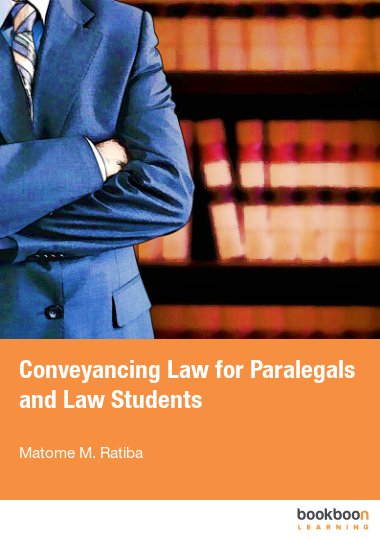The importance of paralegals spread and working across Southern Africa cannot be overstated. They bring legal advice and assistance to the poor and empowering communities to act for their rights. They also reach out to poor communities, where they are often the only access people have to information about their rights, and how to enforce those rights. The past two to three decades has borne witness to an increased drive by public institutions of higher learning to provide the requisite paralegal training, coupled with a noticeable proliferation of private sector training centres all of which has indeed seen over 5,000 paralegals trained and working or volunteering in advice centres, attorneys offices, legal aid clinics and specialised service organisations dealing, for example, with workers’ or women’s rights.
The purpose of this book is to act as a basic guide and thereby equipping paralegals and law students with practical skills in the law and procedures relating to conveyancing: that is, the drafting, evaluation and registration of deeds required for the lawful creation and transfer of ownership and other real rights in land in South Africa. The opening chapter will present a history and overview of the South African Land registration system. In the second chapter, a discussion of the various rights relating to immovable property will be dealt with. The third chapter focuses on the office of the conveyancer and/or notary, particularly the practices and procedures involved therein. The fourth chapter will continue with the same theme albeit from the point of view of the Deeds office. In other words the emphasis will be on the Deeds office practice and procedures. Chapters five and six will respectively deal with the two processes of transferring and mortgaging immovable property as well as zooming in on the relevant instruments of implementing same. Lastly, servitudes and notarial deeds are the subject matter of discussion for chapter seven.
Finally a word of thanks to the following people who contributed in one way or the other to ensure the appearance of this book:
1. Both my deceased parents Diapo Gregory and Moloko Agnes Ratiba whose parental nurture, guidance and wisdom will be sorely missed
2. My wife Lavia Matome Ratiba and family who were very patient and who were the silent inspiration for this work.
3. Bookboon.com for the valuable opportunity afforded to this author and consequently placing the author’s name on the intellectual map
4. My employer the University of South Africa and co employees who shaped both the template and the skeletal framework from which this book could arise
5. Lastly My Creator and Forefathers who gave me strength, perseverance and magnanimous health to be able to complete this work
MM Ratiba
PRETORIA
JUNE 2013

